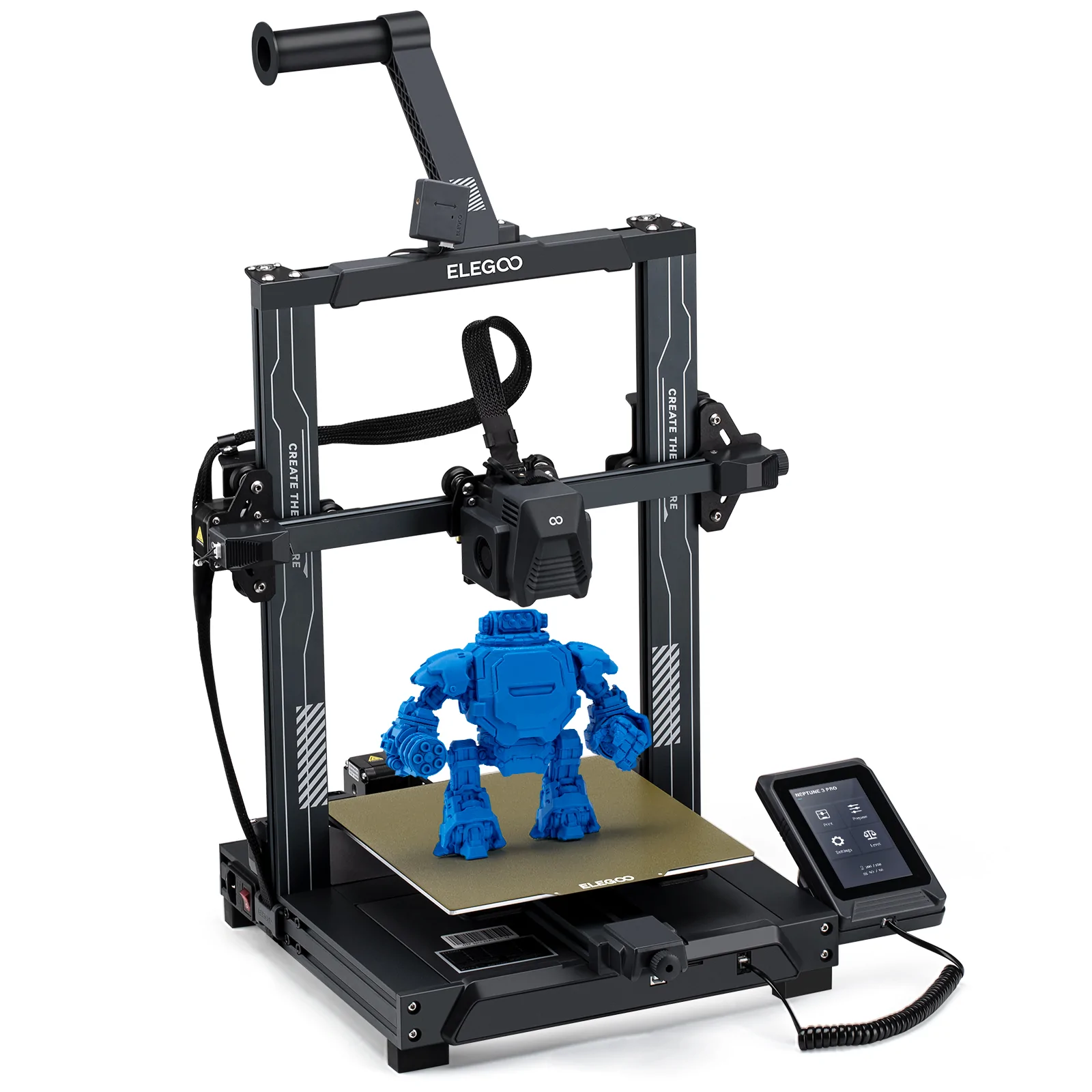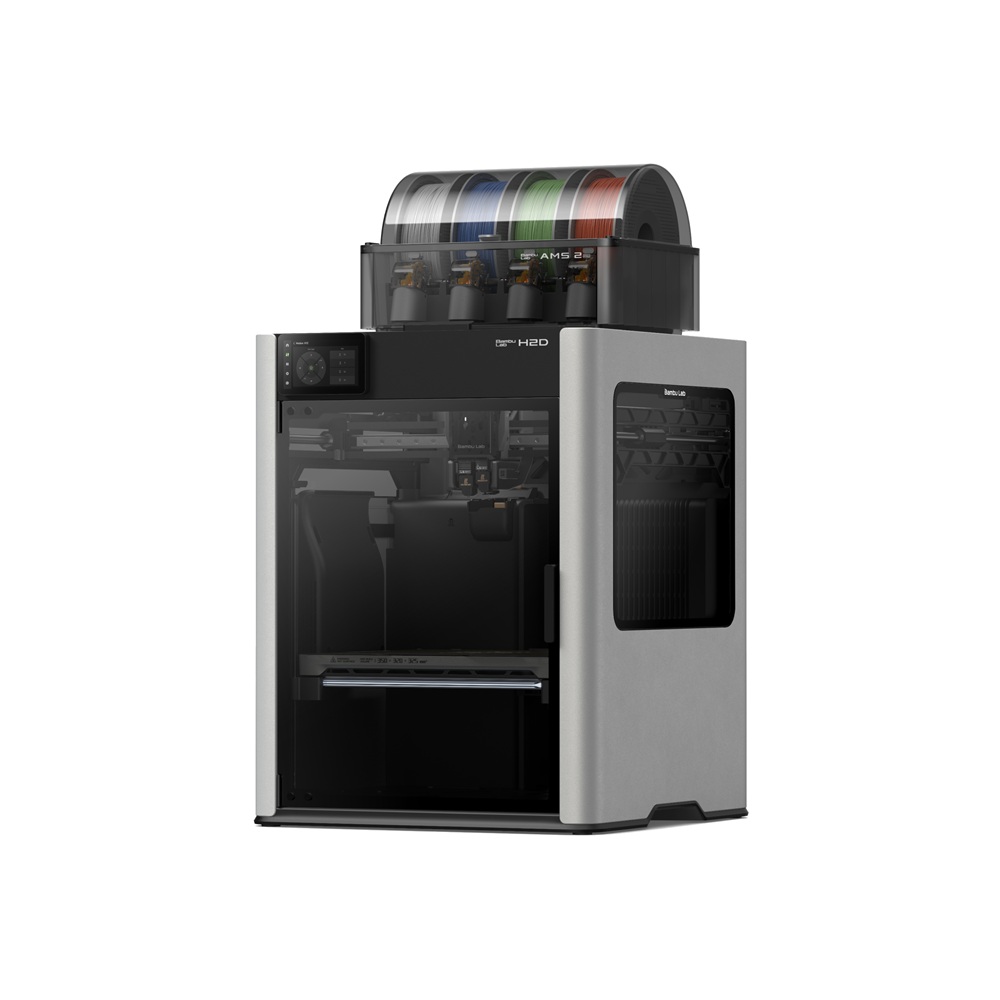Compare Neptune 3 PRO vs H2D
Comparison between the best 3D printers
Choose the best 3D printer at the best price. The cheapest 3D printers are here.
Buy a 3D printer here with 3D Fila.
 |
 |
|
| Model | Neptune 3 PRO |
H2D |
| Printing Material | Filament | Filament |
| Buy Filament for Elegoo Neptune 3 PRO | Buy Filament forBambu Lab H2D | |
| Estimated price | $230,00 | $1899,00 |
| Manufacturer | Elegoo | Bambu Lab |
| Release Year | 2022 | 2025 |
| Print Volume [mm] | 225x225x280 | 350x320x325 |
| Printer Size [mm] | 445x515x475 | 492x514x626 |
| Weight [kg] | 8,1 | 42,3 |
| Power Loss Recovery | YES | YES |
| Enclosed printer | NO | YES |
| Bed Leveling | Automatic | Automatic |
| Filament End Sensor | YES | YES |
| Bed type | Heated | Heated |
| Power supply system | Direct Drive | Direct Drive |
| Standard nozzle | 0,4 | 0,4 |
| Maximum Nozzle Temperature [°C] | 260 | 350 |
| Maximum Bed Temperature [°C] | 100 | 120 |
| Maximum printing speed [mm/s] | 80 | 600 |
| Filament holder | YES | YES |
| Camera for supervision | NO | NO |
| Recommended filaments | PLA, PETG, Tritan, Flex, ABS | PLA, PETG, ABS, ASA, TPU, PVA, Nylon (PA) |
| Recommended slicers | Cura, Simplify, Slic3r, IdeaMaker e outros | Bambu Studio |
| Maximum Resolution [mm] | 0,1 | 0,01 |
| Processor | ||
| Display | Display touchscreen 4,3'' | Touchscreen 5'' |
| Power Supply | 250 | |
| Connectivity | Wifi, Bambu bus, Cartão SD | |
| Operating systems | Windows, Mac, Linux | Windows, Mac, Linux |
| Date of registration in the system | 2023-03-02 | 2025-03-31 |
| Release date | 2022 | 2025 |
| Extra features | The Elegoo Neptune 3 Pro printer stands out for its easy assembly and automatic bed leveling, ideal for different levels of users. Equipped with a direct-drive extruder and dual gears, it offers excellent adhesion to slippery materials such as TPU. It incorporates dual screws on the Z-axis, ensuring stable prints, and features an integrated task light for improved visibility. With a PEI-coated build plate and a detachable touchscreen, it combines functionality and convenience. The printer also features an efficient cooling system, filament sensor and a simplified user interface. | Bambu Labs H2D combines high-speed 3D printing with a chamber heated up to 65 °C, dual extrusion with automatic nozzle switching, an AMS for filament drying and exchange, and AI sensors that detect failures. It offers optional laser and digital cutting capabilities, features intelligent calibration through computer vision, vibration control, enhanced fire safety, and real-time camera monitoring. |
| Support for multiple colors and materials (AMS and CFS) | NO | YES |
Notes * |
||
| Cost-benefit | 6 / 10 | 7 / 10 |
| Hardware | 2.4 / 10 | 7.2 / 10 |
| Tela | . | . |
| Print volume | 3 / 10 | 4 / 10 |
| Performance | 0 / 10 | 5 / 10 |
Conclusion |
| In conclusion, the comparison between the Elegoo Neptune 3 Pro and the Bambu Lab H2D highlights distinct differences suited for varying users and applications. The Elegoo Neptune 3 Pro, with its more accessible price point, offers a solid entry-level option for hobbyists. Its features like automatic bed leveling, dual Z-axis screws, and a user-friendly interface make it ideal for those who may be new to 3D printing. Its print volume is adequate for smaller projects, and it supports a range of filaments, making it a versatile choice for general use. In contrast, the Bambu Lab H2D represents a significant upgrade geared towards professionals and serious enthusiasts. With a much larger print volume, impressive maximum printing speeds, and advanced features like dual extrusion, automatic nozzle switching, and intelligent calibration, it is designed for complex and high-demand printing tasks. Its enclosed design adds safety and allows for better temperature regulation, which is essential for certain materials. Ultimately, the choice between the two comes down to budget, intended use, and desired level of complexity in printing. The Elegoo Neptune 3 Pro offers great value for basic tasks, while the Bambu Lab H2D justifies its higher investment with advanced features that enable superior performance and versatility for more demanding projects. |

